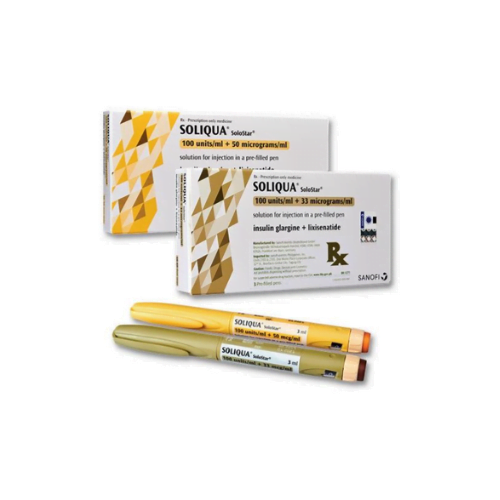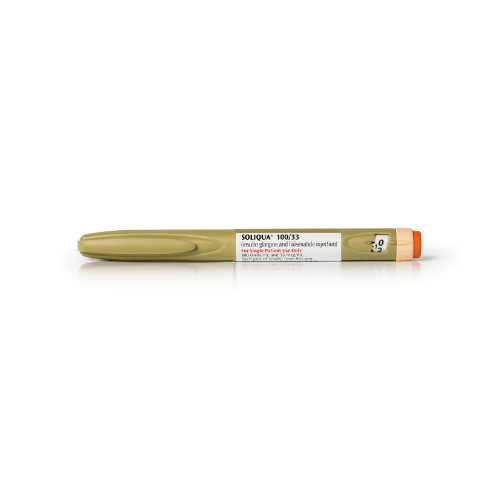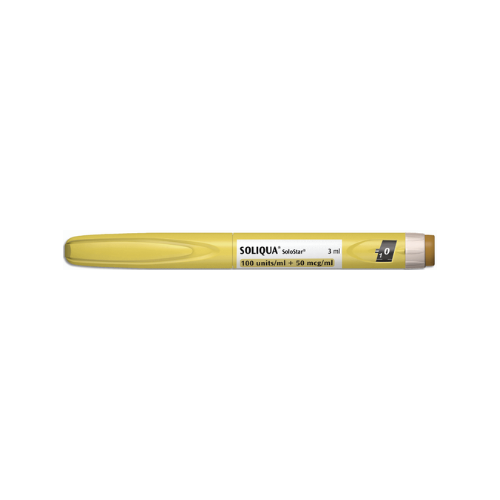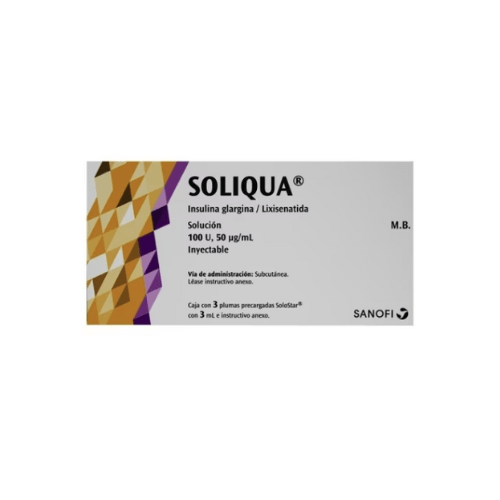Please note: a valid prescription is required for all prescription medication.
Soliqua® SoloStar Pens for Type 2 Diabetes
Offer extended: Use code GET50 at checkout on all orders over $200 and SAVE an additional $50 off all RX meds. Offer extended through March 10, 2026
Coupon code cannot be combined with other offers. Maximum allowable quantity equal to a 90 day supply per single order.
$290.99
Secure Encrypted Payments
Soliqua SoloStar pens combine insulin glargine and lixisenatide for adults with Type 2 diabetes. This page explains how the pens work, who might use them, and key safety points. You can access US delivery from Canada, and see options if paying without insurance.
What Soliqua Is and How It Works
Border Free Health connects U.S. patients with licensed Canadian partner pharmacies; prescriptions are verified with prescribers before dispensing.
This medicine pairs a long-acting basal insulin with a GLP-1 receptor agonist. The insulin supports steady background control, while the incretin component helps the body release insulin when glucose rises after meals and slows stomach emptying. Together, the combination targets fasting and after-meal numbers with one daily injection.
Insulin glargine/lixisenatide 100/33 pens are used with diet and activity for better glucose management in adults who need more than a single agent. It is injected once daily within the hour before the first meal of the day. Do not mix it with other insulins or use it in an insulin pump.
Who It’s For
This treatment is for adults with T2D who are not adequately controlled on basal insulin or on a GLP-1 receptor agonist alone. It is not for type 1 diabetes or diabetic ketoacidosis. It should not be used with another GLP-1 receptor agonist at the same time.
People with severe stomach problems, such as gastroparesis, should avoid it. Those with a history of pancreatitis, significant kidney issues, or serious allergic reactions to any component should discuss risks with a clinician. Review your other conditions and all medicines during your consultation.
To explore broader therapy options and education, you can review our resources on Type 2 Diabetes and browse the Diabetes Care category.
Dosage and Usage
Use this pen once daily within the hour before your first meal. Starting dose and adjustments depend on prior insulin or GLP-1 use. Your prescriber will set the initial dose and a titration plan based on fasting glucose. Do not share pens or needles. Rotate injection sites in the abdomen, thigh, or upper arm to reduce skin problems.
The Soliqua 15-60 units dosing pen delivers a fixed-ratio combination across a defined range. After dialing your dose, inject subcutaneously and hold the needle in the skin for the time recommended in the official instructions. Do not administer two doses on the same day. When uncertain, follow the approved label or ask your clinician.
For background reading on basal insulins and schedules, see Long Acting Insulin and Different Types Of Insulin.
Strengths and Forms
This therapy is supplied as SoloStar prefilled disposable pens. Each pen contains 3 mL of solution in a fixed ratio of insulin glargine 100 units/mL and lixisenatide 33 mcg/mL. Boxes often include multiple pens; availability can vary by pharmacy partner.
Soliqua prefilled injection pens are color-coded and designed for daily single-patient use. Your prescriber will specify pen strength and the dose range appropriate to your needs. Always confirm the carton and pen label before first use.
Missed Dose and Timing
If you miss a dose, inject the next scheduled dose before your first meal on the following day. Do not take an extra dose or increase the dose to make up for a missed injection. Try to keep a consistent routine with morning administration to support steady results.
Storage and Travel Basics
Unopened pens should be kept refrigerated as directed on the label and never frozen. Protect pens from heat and light. Once in use, store the pen at recommended room temperature for the labeled in-use period, and then discard it even if some solution remains. Do not leave a needle attached between injections.
For trips, keep pens and supplies in your carry-on, with a copy of your prescription or a travel letter. Use a travel case to avoid temperature extremes. Partner pharmacies maintain temperature-controlled handling when required. Keep all medicines out of children’s reach.
To learn about pen types and travel-friendly tips, read Types Of Insulin Pen.
Pen Handling and Sharps Disposal
Before each injection, read the instructions for use that come with the pen. Inspect the solution; do not use if you see particles or discoloration. Attach a new sterile needle, prime per the device guide, dial the prescribed dose, and inject into recommended sites.
- New needle each time: reduce contamination and clogging.
- Correct technique: pinch if advised, insert, and hold to ensure full dose.
- Remove needle: detach right after the injection to prevent leaks.
- Safe disposal: place used needles in an approved sharps container.
- Local rules: follow community guidance for sharps drop-off or mail-back.
Never share a pen or needle with anyone, even if the needle is changed.
Benefits
This combination can simplify care by covering fasting and after-meal glucose with one daily injection. It may reduce the number of separate injections and pens you manage. The fixed ratio supports coordinated action without juggling two devices. Many people appreciate having a single routine aligned to breakfast.
The treatment also allows supervised dose titration over time, which can support better day-to-day readings. Consistent use, meal planning, and physical activity work together to improve outcomes.
Side Effects and Safety
- Gastrointestinal effects: nausea, vomiting, diarrhea, and decreased appetite.
- Injection-site issues: redness, itching, or mild swelling.
- Headache or dizziness: usually mild and transient.
- Upper respiratory symptoms: runny nose or sore throat.
Serious risks are uncommon but can include pancreatitis, severe allergic reactions, kidney problems, or significant dehydration from vomiting. Low blood sugar can occur, especially when combined with insulin secretagogues. Seek immediate care for severe abdominal pain, swelling of face or throat, confusion, or signs of hypoglycemia.
Drug Interactions and Cautions
The GLP-1 component can slow stomach emptying, which may affect how some oral medicines are absorbed. For drugs with narrow therapeutic windows or that need rapid absorption, timing adjustments may be necessary per the official label. Discuss blood thinners, antibiotics, thyroid pills, and birth control timing with your clinician.
Insulin used with sulfonylureas or alcohol can increase hypoglycemia risk. Thiazolidinediones with insulin may cause fluid retention. Avoid combining with another GLP-1 receptor agonist. Review kidney function and any history of pancreatitis or gallbladder disease with your healthcare professional.
For broader context on basal therapies, see Levemir Vs Lantus and 5 Types Of Insulin.
What to Expect Over Time
During the first weeks, some people notice stomach upset that tends to lessen with steady use. As doses are adjusted, fasting and after-meal numbers may become more consistent. Your prescriber will guide gradual changes based on logs or meter data. Keep a simple record of doses, meals, and readings to support decisions at visits.
Realistic expectations and daily routines matter. Try to inject around the same time, align meals, stay hydrated, and keep modest activity. Over time, your A1C goal and day-to-day stability may improve when the plan is followed alongside nutrition and movement strategies.
Compare With Alternatives
Some adults may instead use a basal insulin alone. Options include U-100 insulin glargine such as Insulin Lantus, or a more concentrated formulation like Doublestar Prefilled Pen. Your clinician can explain when a single-agent basal or a separate GLP-1 may be preferred.
Pricing and Access
Many patients compare options to take advantage of Canadian pricing while obtaining US shipping from Canada. You can view current availability on this page and see how multi-pen packs affect overall budgeting. If you are paying without insurance, our team can help you understand typical self-pay approaches and documentation needs.
To look for current coupons or seasonal offers, check our Promotions page. For added learning on therapy choices, see Lantus Insulin Uses. If you prefer tablet options with your clinician’s guidance, you can review Sitagliptin or Sitagliptin Malate.
Availability and Substitutions
Supply can vary. If a specific pack is not available, a prescriber may recommend an alternative dose configuration or a different therapy in the same class. We also offer human insulins and other agents in the Diabetes Care section and list country of origin on product pages, including Canada.
Patient Suitability and Cost-Saving Tips
This combination may suit adults needing both basal support and incretin effects in a single daily pen. It may not be appropriate for those with severe gastrointestinal disease, recent pancreatitis, or very high daily insulin requirements. Discuss your goals, glucose patterns, and kidney function with your clinician before starting.
- Multi-month fills: fewer refills and steadier access.
- Bundle supplies: add needles and swabs in one order.
- Reminders: set calendar alerts for renewal.
- Travel planning: order before trips to avoid gaps.
- Simple logs: track doses and readings for visits.
Reading about insulin classes can help you and your prescriber choose the simplest plan. For a primer, visit Different Types Of Insulin.
Questions to Ask Your Clinician
- Starting dose: how is my initial unit setting chosen?
- Titration: what signs mean I should contact you about adjustments?
- Meals: what breakfast timing pairs best with my injection?
- Low sugar: how should I treat and prevent hypoglycemia?
- Oral meds: do any pills need timing changes around my shot?
- Sick days: what steps should I follow during illness?
- Travel: how should I pack and document pen supplies?
Authoritative Sources
- Sanofi: Soliqua 100/33 Prescribing Information
- FDA DailyMed: Soliqua 100/33
- Health Canada Drug Product Database
Ready to get started? Place your prescription order for these pens with prompt, express shipping that Ships from Canada to US. This content is informational and not a substitute for medical advice; always follow your prescriber’s directions.
Express Shipping - from $25.00
Shipping with this method takes 3-5 days
Prices:
- Dry-Packed Products $25.00
- Cold-Packed Products $35.00
Shipping Countries:
- United States (all contiguous states**)
- Worldwide (excludes some countries***)
Standard Shipping - $15.00
Shipping with this method takes 5-10 days
Prices:
- Dry-Packed Products $15.00
- Not available for Cold-Packed products
Shipping Countries:
- United States (all contiguous states**)
- Worldwide (excludes some countries***)
How should I time my daily injection with meals?
This pen is taken once daily within the hour before your first meal. Pick a regular morning time that fits your routine and use that window each day. If your breakfast schedule varies, choose a consistent anchor, such as before coffee or right after you prepare food. Steady timing supports consistent absorption and results. If your schedule changes for travel or shift work, ask your clinician how to keep the routine stable.
What side effects are most common at the start?
Nausea, diarrhea, and decreased appetite are the most common early effects. These often lessen with continued use as your body adapts. Injecting before the first meal may help tolerability. Stay hydrated, eat smaller meals, and avoid heavy, high-fat foods while you are settling in. If vomiting is persistent, if you cannot keep fluids down, or if you have severe belly pain, contact your healthcare professional promptly.
Can this pen cause low blood sugar?
Yes. Because it contains insulin, low blood sugar can occur, especially if meals are skipped, you drink alcohol, or you also take medicines like a sulfonylurea. Keep fast-acting carbohydrates on hand for symptoms such as shakiness, sweating, or confusion. Your prescriber may adjust other therapies to reduce risk. Report recurrent lows or nighttime symptoms so your plan can be reviewed for safety.
What if I am switching from basal insulin alone?
Your clinician will base the starting dose on your prior daily basal amount and your current glucose patterns. Once-daily administration before the first meal continues, but the initial unit setting and titration schedule may change. Do not stop or change other diabetes medicines on your own. Track fasting readings during the first weeks and share them during follow-up so adjustments can be made if needed.
How long can an in-use pen be kept at room temperature?
Follow the storage directions in the official labeling for in-use pens. Unopened pens are refrigerated; after first use, the pen is kept at recommended room temperature and then discarded at the end of the labeled in-use period, even if some solution remains. Keep pens away from heat, direct sunlight, and vehicle glove compartments. Never freeze the product, and do not use it if it has been frozen.
Do I need to separate oral medicines around my injection?
The GLP-1 component can slow stomach emptying, which may affect absorption of certain pills. Medicines with narrow therapeutic ranges or those that need fast uptake sometimes require timing adjustments. Your clinician can advise whether to take specific pills before the injection. Always share an updated medication list, including over-the-counter products and supplements, at each visit.
Can I use this with other GLP-1 medicines or weight-loss shots?
No. It shouldn’t be combined with another GLP-1 receptor agonist. Using two agents from the same class increases side effects without added benefit and could raise safety concerns. If you are already on a GLP-1 or a weight-loss injection, tell your prescriber. They can recommend whether to continue, stop, or transition to a different plan based on your goals and glucose patterns.
Rewards Program
Earn points on birthdays, product orders, reviews, friend referrals, and more! Enjoy your medication at unparalleled discounts while reaping rewards for every step you take with us.
You can read more about rewards here.
POINT VALUE
How to earn points
- 1Create an account and start earning.
- 2Earn points every time you shop or perform certain actions.
- 3Redeem points for exclusive discounts.
How to book an appointment
- 1Create Begin by completing a profile or log into your existing account. This step ensures we have the necessary information to provide you with a service that's tailored to your needs. account and start earning.
- 2Scheduling an appointment with our online booking system is easy. Pick a day and time that suits you. You’ll receive an immediate confirmation, without the wait.
- 3Discuss your concerns and symptoms and receive a thorough diagnosis from one of our licensed doctors during a confidential video appointment.
- 4If you've been prescribed medication, your Rx is sent directly to one of our licensed pharmacies and delivered right to your door.
Get Started
To book an online doctor appointment, register for an account or login. After doing so, you can book your visit on this page.



